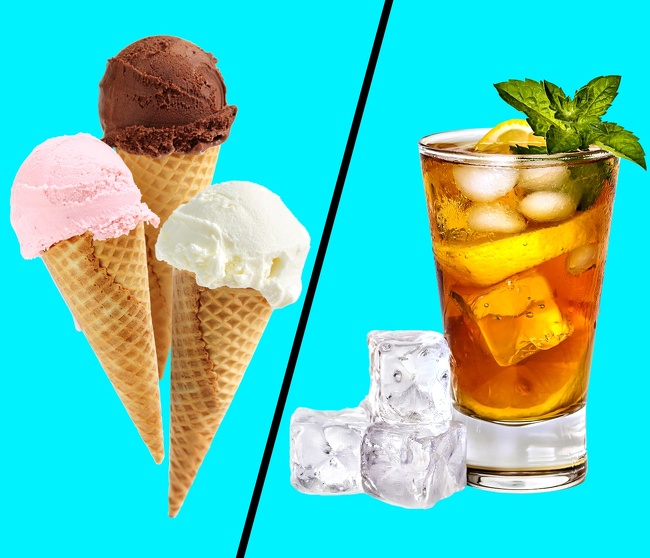Although the exact cause of migraines is still unknown, experts agree that severe headaches can be provoked by the medicine you take, abrupt changes in your endocrine system, and lack of sleep among other reasons. Your eating habits also affect the way you feel. According to studies, about 10% of people suffer from migraines that are triggered by mistakes in their diet.
We have made a list of the most common food products that can provoke migraine attacks.
7. Aged cheese

Cheese that goes through the aging process may be a migraine trigger for many people as it is high in tyramine. Tyramine comes from the amino acid, tyrosine and is usually formed in foods that are spoiled, pickled, aged, smoked, fermented, or marinated.
- Aged cheeses include: cheddar, feta, blue, brie, parmesan, gouda, gruyere, Swiss, and muenster.
- Fresh cheeses don’t include much tyramine and can be safe to eat even if you sometimes have migraine attacks. Fresh cheeses include: farmer, cottage, American, cream, and ricotta cheeses.
- Mozzarella may or may not be aged, so double-check the label before buying it.
6. Citrus fruits

Sour fruits contain a lot of acid that can affect your blood’s pH level and increase your chances of having a migraine headache. Some studies show that about 11% of people with headaches have reported citrus fruits to be their migraine trigger.
Besides that, these fruits contain tyramine and histamine that can also affect your health if you are intolerable to them.
5. Cold foods

If you are used to eating ice cream or gulping cold drinks quickly when you are over-heated from physical exercises or hot temperatures, you may get a cold-stimulus headache which usually lasts anywhere from 25-60 seconds to 1-2 minutes.
4. Gluten

Gluten is a protein found in such grains such as wheat, rye, barley and triticale. These grains, as well as products made from them, may trigger migraines in gluten-intolerant people.
3. Food additives

Additional chemicals in foods usually have no nutritional value and can have negative effects on your health. So if you often have headaches, try to stay away from the following additives:
Monosodium glutamate (MSG — E621) is a common meat tenderizer and flavor enhancer. This preservative is one of the main ingredients of Asian foods, soy sauce, processed foods, and canned vegetables. It can spark a migraine within 20 minutes of consuming it.
Nitrates and nitrites are usually found in processed meats such as hot dogs, sausages, ham, pepperoni, bacon, as well as some heart medicines. When these additives get into your body, your blood vessels start swelling and it may cause a severe headache.
Aspartame (APM) and sucralose (E955) are artificial sweeteners that can be found in diet soft drinks, sports drinks, sugar-free products, and even in children’s vitamins. If you are sensitive to these additives, you can get a migraine attack after taking them.
Red and yellow food coloring is usually found in candy, ice cream, potato chips, sodas, crackers, jams, cereal bars and many other products. They are made of petroleum, the same ingredient used to make motor oil, which is certainly not good for your health.
2. Caffeine

Excessive consumption of caffeine may contribute to the onset of a headache. That’s why you should limit your caffeine intake to 200-300 milligrams (2-3 cups of coffee) a day. Note that caffeine can also be found in products like chocolate, cocoa, tea, Coca-Cola, and even some painkillers.
1. Alcoholic drinks

Most people know that red wine can cause migraines, but studies show that other alcoholic beverages like beer, sparkling wine, and some strong spirits can also make your head pound.
There are two types of headaches provoked by alcoholic drinks. The first one is the typical headache that usually starts within a few hours (from 30 minutes to 3 hours). The other type is a delayed alcohol-induced headache (DAIH), or a hangover.
How to hold off migraines

Your eating habits also play a great role in the status of your health. If you want to keep migraine attacks under control, try to follow these simple rules:
Stay hydrated. Dehydration headaches may occur after extreme sweating or because of diarrhea and/or vomiting. They can appear along with symptoms such as dizziness, fatigue, and a fast heart rate. Don’t forget to drink at least 8 glasses of water a day to make sure your body is working properly.
Don’t skip meals. Instead, you can eat mini meals 5-6 times a day. It will prevent you from getting a headache because you’re hungry.
Take vitamins and minerals. Low intake of folic acid, magnesium, iron, copper, vitamins D, B2, B6, and B12 can lead to severe headaches. To maintain a balance of macro and micro-elements in your body, it’s better to buy an additional dietary supplement.
Eat more fruits, vegetables, and legumes. They contain natural estrogens that neutralize the negative effects of the estrogen our body makes. It’s particularly helpful for women who suffer from migraines during their periods.












